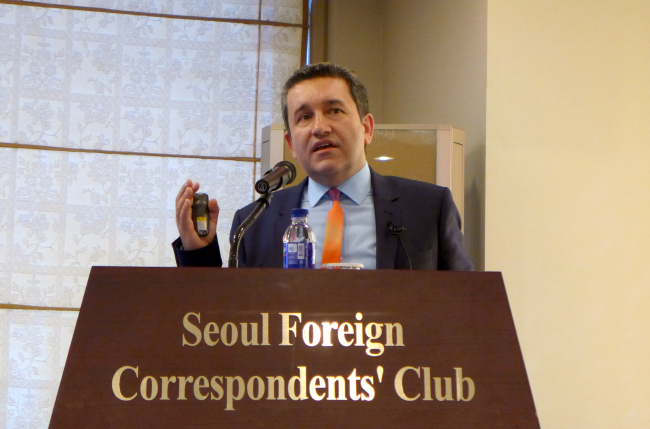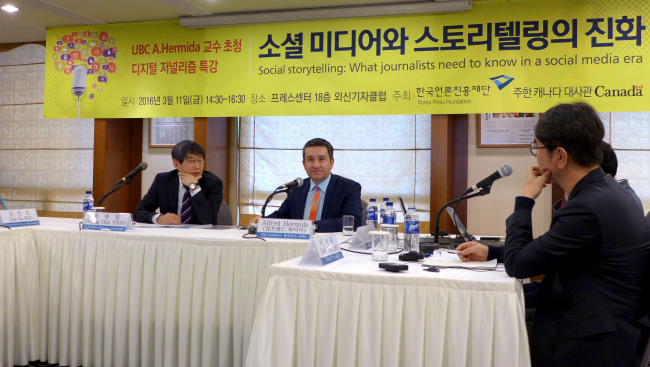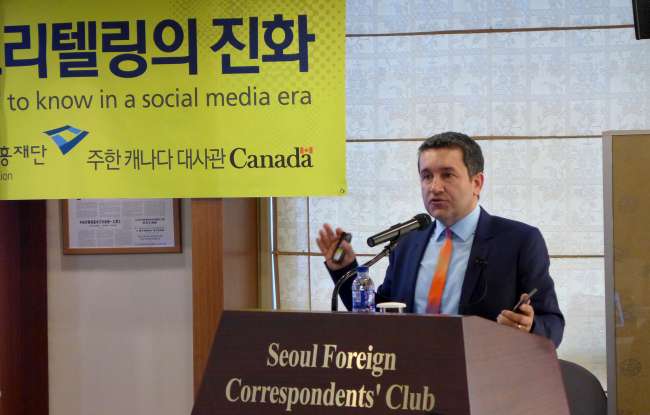In the digital age, journalists who are jacks-of-all-trades will be increasingly valued, a renowned media scholar said, stressing that quality content is increasingly prized and reporters need to differentiate their work.
“Journalists will need more skills, because readers already know what happened from an array of sources,” Alfred Hermida, director and associate professor at the University of British Columbia Graduate School of Journalism, told The Korea Herald last week.
“Being a good journalist is not enough. It’s about what you have that other journalists don’t that gives values to your organization and the wider audience.”
Hermida, 16-year veteran at the British Broadcasting Corporation and founding news editor of the BBC News website in 1997, came to Korea in mid-March on the invitation of the Canadian Embassy in Seoul. On March 11, he gave a lecture at the Seoul Foreign Correspondents’ Club in the Korea Press Center. The seminar was organized by the embassy and the Korea Press Foundation.
 |
Alfred Hermida, director and associate professor at the University of British Columbia Graduate School of Journalism, speaks at a seminar titled “Social storytelling: what journalists need to know in a social media era” at the Seoul Foreign Correspondents’ Club in the Korea Press Center on March 11. (Joel Lee / The Korea Herald) |
As journalism has become highly competitive and journalists all across have the “basics” -- conducting interviews, verifying facts and explaining backgrounds – “additional skills” such as special expertise, visual sensibility or dexterity with photography or video-editing will be needed, he underlined.
“What’s increasingly prized is expertise and insight,” the British-Canadian scholar said. “There is a qualitative shift in journalism toward analysis.”
He argued that people will continue to demand “accurate, informative and trustworthy” news but “what has changed are the technologies, conditions and spaces through which news is consumed.”
At the seminar, attended by more than 120 journalists, academics and related specialists, Hermida said the media world had become “far more complicated” due to digital technologies.
“The marketplace we are in now is about ‘attention’ because we have gone from a world of news scarcity to abundance -- information overload,” he said. “Instead of news outlets being ‘destinations,’ where people go to get information, they have become journeys -- places inhabited through Facebook, KakaoTalk, television and radio.”
Noting that news has turned into an ever-present reality, he emphasized that newspapers need to operate beyond the “5 p.m. deadline” and try to sell “the experience of news” by merging with diverse platforms.
“We don’t have all the answers. We are still figuring out our paths and questions for the future,” he said. “We need to have the room to ask difficult questions and take chances. Try new things, if they don’t work, stop doing it.”
The scholar wrote the book “Tell Everyone: Why We Share and Why It Matters” in 2014, which won last year’s National Business Book Award in Canada.
 |
Alfred Hermida, director and associate professor at the University of British Columbia Graduate School of Journalism, speaks at a seminar titled “Social storytelling: what journalists need to know in a social media era” at the Seoul Foreign Correspondents’ Club in the Korea Press Center on March 11. (Joel Lee / The Korea Herald) |
During the interview, Hermida expressed optimism for machinated reporting, spearheaded by the Associated Press, which has churned out articles using automated system “Wordsmith” since June 2014. Articles generated increased tenfold to 3,000 every quarter, providing wider coverage and saving 20 percent of journalists’ time, according to the AP.
Citing his research at the Los Angeles Times, the professor said the newspaper was able to vastly multiply crime coverage, allowing journalists to follow specific stories for in-depth, investigative reportage.
“Humans can focus on the higher-level functions requiring greater degrees of interpretation, analysis and providing of context -- the ‘how’ and ‘why’” he noted, “while robots can do the ‘who,’ ‘what,’ ‘when’ and ‘where.’”
Hermida, who covered the Middle East for four years as a BBC correspondent, said the rise of mobile phone use and spread of South Korean pop-culture in North Korea may not instigate an uprising as did during the Arab Spring.
“One of the fallacies with social media is that we see what we want to see,” he said, adding that “the broader picture is much more complicated.”
“Regarding North Korea, we could get seduced into the idea of people with mobile phones and K-pop triggering a revolution,” he claimed. “This might not be a true reflection of what the North Koreans want.”
 |
Alfred Hermida, director and associate professor at the University of British Columbia Graduate School of Journalism, speaks at a seminar titled “Social storytelling: what journalists need to know in a social media era” at the Seoul Foreign Correspondents’ Club in the Korea Press Center on March 11. (Joel Lee / The Korea Herald) |
As many Arab Spring countries regressed into autocracy, anarchy or armed conflict following the popular revolt from the end of 2010 to the middle of 2012, he said political change depends on the military’s decision and people’s vital interests.
In Tunisia, he added, a broad spectrum of society was involved in overthrowing the regime, whereas in Egypt, a segment of society chose dictatorship over freedom for stability.
“Social change does have political consequences,” he asserted. “But if there are people willing to accept suppression, there is no guarantee for political change, no matter how many mobile phones they have.”
“When you put tweets against bullets, bullets win. Social media undermines pluralistic ignorance. But political change doesn’t happen overnight. It takes more than a generation,” he added.
By Joel Lee (
joel@heraldcorp.com)










